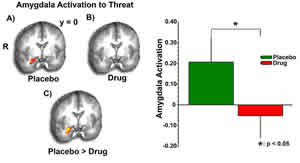Published: April 19, 2008
Right now, about half of all people who take medicine for an anxiety disorder don’t get much help from it. And doctors have no definitive way to predict who will, and who won’t, benefit from each anti-anxiety prescription they write.But a University of Michigan Medical School researcher and his team are working to bring more certainty to how doctors and patients choose anxiety treatments, by probing the connection between brain activity, genetics and medication.

These brain scans and graph show that response to a threat was greatly reduced when study volunteers received THC, compared with placebo. This indicates that the brain’s cannabinoid system may be a good target for anxiety disorder treatments
[continue reading…]
 Anxiety gets a lot of bad press. Dwelling on the negative can lead to chronic stress and anxiety disorders and phobias, but evolutionarily speaking, anxiety holds some functional value. In humans, learning to avoid harm is necessary not only for surviving in the face of basic threats (such as predators or rotten food), but also for avoiding more complex social or economic threats (such as enemies or questionable investments).
Anxiety gets a lot of bad press. Dwelling on the negative can lead to chronic stress and anxiety disorders and phobias, but evolutionarily speaking, anxiety holds some functional value. In humans, learning to avoid harm is necessary not only for surviving in the face of basic threats (such as predators or rotten food), but also for avoiding more complex social or economic threats (such as enemies or questionable investments).
A team of psychologists at Stanford University have identified a region of the brain, the anterior insula, which plays a key role in predicting harm and also learning to avoid it. In a new study, Gregory Samanez-Larkin and colleagues scanned the brains of healthy adults while they anticipated losing money. [continue reading…]
Published: February 26, 2008
People with major depression accompanied by high levels of anxiety are significantly less likely to benefit from antidepressant medication than those without anxiety, according to a study based on data from the NIMH-funded Sequenced Treatment Alternatives to Relieve Depression (STAR*D) study. The study was published online ahead of print in January 2008, in the American Journal of Psychiatry. [continue reading…]
Published: February 25, 2008
A new study indicates that smoking is linked to anxiety with depression, as well as to anxiety alone. However, people who are depressed but not anxious smoke the same as any other smokers. These findings come from a joint study from Norwegian Institute of Public Health (NIPH), University of Bergen and King’s College in London.
The link between smoking and anxiety/depression was most apparent among women and young people. Data were collected from 60 000 participants in “Health Studies in North-Troendelag” (HUNT), a study based in a county in northern Norway.
Figures from the World Health Organisation (WHO) show that 30 percent of inhabitants in the western world smoke daily. Earlier studies have found that people with mental health problems are twice as likely to smoke as the rest of the population. Injuries to physical health after smoking are well documented. It is also known that smoking is linked to other psychological problems. Anxiety and depression are the most common complaints and are often both present in people who smoke.
[continue reading…]


